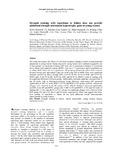Mostrar el registro sencillo del ítem
Strength training with repetitions to failure does not provide additional strength and muscle hypertrophy gains in young women
| dc.creator | Martorelli, Saulo | es_ES |
| dc.creator | Lusa Cadore, Eduardo | es_ES |
| dc.creator | Izquierdo Redín, Mikel | es_ES |
| dc.creator | Celes, Rodrigo | es_ES |
| dc.creator | Martorelli, André | es_ES |
| dc.creator | Cleto, Vitor Alonso | es_ES |
| dc.creator | Alvarenga, José Gustavo | es_ES |
| dc.creator | Bottaro, Martim | es_ES |
| dc.date.accessioned | 2018-09-04T06:43:45Z | |
| dc.date.available | 2018-09-04T06:43:45Z | |
| dc.date.issued | 2017 | |
| dc.identifier.issn | 2037-7452 (Print) | |
| dc.identifier.issn | 2037-7460 (Electronic) | |
| dc.identifier.uri | https://hdl.handle.net/2454/30425 | |
| dc.description.abstract | This study investigated the effects of a 10-week resistance training to failure on neuromuscular adaptations in young women. Eighty-nine active young women were randomly assigned to one of three groups: 1) repetitions to failure (RF; three sets of repetitions to failure); 2) repetitions not to failure with equalized volume (RNFV; four sets of 7 repetitions); and 3) repetitions not to failure (RNF; three sets of 7 repetitions). All groups performed the elbow flexor exercise (bilateral biceps curl) and trained 2 days per week using 70% of 1RM. There were significant increases (p<0.05) in muscle strength after 5 (15.9% for RF, 18.4% for RNF, and 19.9% for RNFV) and 10 (28.3% for RF, 26.8% for RNF, and 28.3% for RNFV) weeks of training, with no significant differences between groups. Additionally, muscular endurance increased after 5 and 10 weeks, with no differences between groups. However, peak torque (PT) increased significantly at 180°.s-1 in the RNFV (13.7%) and RNF (4.1%) groups (p<0.05), whereas no changes were observed in the RF group (-0.5%). Muscle thickness increased significantly (p<0.05) in the RF and RNFV groups after 5 (RF: 8.4% and RNFV: 2.3%) and 10 weeks of training (RF: 17.5%, and RNFV: 8.5%), whereas no significant changes were observed in the RNF group (3.9 and 2.1% after 5 and 10 weeks, respectively). These data suggest that short-term training of repetitions to failure do not yield additional overall neuromuscular improvements in young women. | en |
| dc.description.sponsorship | This study was partially supported by the Council for the Research Development (CNPq) and by the Coordination for the Improvement of Higher Level Personnel (Capes). | en |
| dc.format.extent | 8 p. | |
| dc.format.mimetype | application/pdf | en |
| dc.language.iso | eng | en |
| dc.publisher | PAGEPress | en |
| dc.relation.ispartof | European Journal of Translational Myology, 27 (2): 113-120 | en |
| dc.rights | This article is distributed under the terms of the Creative Commons Attribution Noncommercial License (CC BY-NC 4.0) which permits any noncommercial use, distribution, and reproduction in any medium, provided the original author(s) and source are credited. | en |
| dc.rights.uri | https://creativecommons.org/licenses/by/4.0/ | |
| dc.subject | Strength training to failure | en |
| dc.subject | Muscle hypertrophy | en |
| dc.subject | Young women | en |
| dc.subject | Fatigue | en |
| dc.subject | Maximum exercise | en |
| dc.title | Strength training with repetitions to failure does not provide additional strength and muscle hypertrophy gains in young women | en |
| dc.type | info:eu-repo/semantics/article | en |
| dc.type | Artículo / Artikulua | es |
| dc.contributor.department | Ciencias de la Salud | es_ES |
| dc.contributor.department | Osasun Zientziak | eu |
| dc.rights.accessRights | info:eu-repo/semantics/openAccess | en |
| dc.rights.accessRights | Acceso abierto / Sarbide irekia | es |
| dc.identifier.doi | 10.4081/ejtm.2017.6339 | |
| dc.relation.publisherversion | https://doi.org/10.4081/ejtm.2017.6339 | |
| dc.type.version | info:eu-repo/semantics/publishedVersion | en |
| dc.type.version | Versión publicada / Argitaratu den bertsioa | es |



